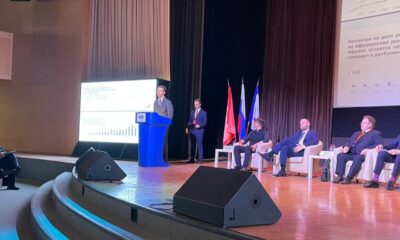National Issues
Assembling to Share the National Cake? -By Soji Apampa


Soji Apampa
…where does corruption come into all of these? When there is lack of transparency and accountability, corruption thrives. The financial arrangements of the National Assembly have been shrouded in fierce secrecy for years. Since coming into office, Mr. President has heavily signalled his fight against corruption, yet our legislators seem to be more concerned about their self-interest and privileges.
What is the purpose of our National Assembly? To act as gatekeepers and toll collectors or to act as a check and balance to the other arms of government (Executive and Judiciary)? What primary function does legislation play in modern society and what therefore should we expect of legislators?
There has been widespread public uproar and debate since Premium Times delivered an exposé, on August 18, on federal lawmakers’ pay. The packages of National Assembly members have been an issue of grave concern to many Nigerians for a while. The report asserts that our legislators cost the nation a jaw dropping N8.72 billion per year. 360 House of Representative (HOR) members guzzle N6.58 billion every year, whilst N2.14 billion per year is ascribed to 109 Senators. However to be sure, this is not the really outrageous bit since per person, the sums involved are much smaller than the average pay of anyone on senior management level in a bank. However, when compared to the earnings of legislators in the G7 nations and other wealthier countries, Nigerian legislators apparently earn more – only coming in second to their Australian counterparts. What is perhaps alarming is the funny structuring of these packages using non-taxed allowances, which are estimated to be about 870 percent and 820 percent respectively of the basic salaries of Senators and Representatives. If legislation is about the body of formal laws, rules, regulations and so on that govern allowable interactions society, it is a funny bunch of people we have selected as legislators if what they have done with the authority given to them is to structure their pay in ways that diminish what accrues to the common purse, whilst making laws to make us culpable if we, the people, do not contribute maximally to this same purse.
In addition, Premium Times alleges that the pay packages they have estimated do not include illegal quarterly allowances that legislators pay themselves, which they suggest come to well over N100million every quarter. Now, this is perhaps the bit one should shout the loudest about because if true; it is indeed outrageous! If they are illegal, why hasn’t anyone moved to do away with this portion? It sounds really simple, but if it were as simple as that, why hasn’t anyone succeeded in doing that? So, is this the real motivation for becoming a lawmaker in Nigeria? Ministries, Departments and Agencies of the Federal Government have also complained that lawmakers demand a portion of their already meagre capital budgets to be spent on “constituency projects,” which legislators then suggest contractors for. It doesn’t require super imagination to guess where such funds could end up. It begs the question, do our lawmakers purely assemble to share the “national cake”? Are the ‘honourable’ members of the NASS entitled to have their cake and eat it too?
There shall be repercussions on the budget process whichever route is chosen, whether to reduce, or restructure their pay or to block the illegal ones: we should therefore brace ourselves for a showdown around executive bills such as the appropriation bill. This is a fight Nigerians should brace up for and get really vocal about because it may be now or never to determine whether or not they are assembling to share the national cake.
In light of the decline in oil prices and other negative economic factors, the Revenue Mobilisation, Allocation and Fiscal Commission (RMAFC) who claim to have been working on the review of the salaries and allowances of lawmakers since the beginning of the year stated through their Chairman, Mr. Mbam, that the review is expected to be ready by the end of the month. According to him, “no member of the National Assembly should earn up to N1million per month.” It remains to be seen if this will only be a reflection of basic salaries or if it will take into account the entire pay packages i.e. allowances (legal and illegal) as well. The RMAFC is constitutionally charged with determining an appropriate remuneration package for all political office holders. Section 32 (d) of Part One of the Third Schedule of the 1999 Constitution empowers the RMAFC to determine the salaries and allowances of all political office holders, both appointed and elected. It says that the commission shall “determine the remuneration appropriate for political office holders including the President, Vice President, Governors, Deputy Governors, Ministers, Commissioners, Special Advisers, legislators and the holders of the office mentioned in sections 84 and 124 of the constitution.
So where does corruption come into all of these? When there is lack of transparency and accountability, corruption thrives. The financial arrangements of the National Assembly have been shrouded in fierce secrecy for years. Since coming into office, Mr. President has heavily signalled his fight against corruption, yet our legislators seem to be more concerned about their self-interest and privileges. Surely there are some lawmakers in right standing that can join in the call for the decent to be done. The recommended approach for the RMAFC will be to look at putting a tax on entire pay packages i.e. both salaries and known allowances. Which way is the pendulum going to swing? Should we suggest the legal salaries of legislators should be untouched but restructured to optimise for tax whilst all stakeholders should block the illegal allowances, being illegal? Going the taxation route may prove to be less frustrating and more implementable. It may also receive more buy-in. The President cannot fight the corruption fight alone; he needs the support of the people to effectively wage war against corruption. There shall be repercussions on the budget process whichever route is chosen, whether to reduce, or restructure their pay or to block the illegal ones: we should therefore brace ourselves for a showdown around executive bills such as the appropriation bill. This is a fight Nigerians should brace up for and get really vocal about because it may be now or never to determine whether or not they are assembling to share the national cake.
Soji Apampa, the co-founder of The Integrity Organisation, can be reached at Twitter: @sojapa, and email: soji.apampa@integritynigeria.org.


















